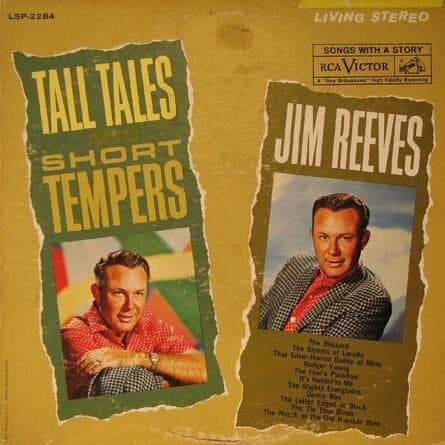
A tragic ballad of a man’s final act of loyalty to his horse.
There are songs that tell stories, and then there are songs that become stories themselves—indelible narratives that freeze a moment in time and emotion. Jim Reeves‘s “The Blizzard” is undoubtedly one of the latter. Released in early 1961 on the album Tall Tales and Short Tempers, and as a single with “Danny Boy” as its B-side, the song is a masterclass in emotional storytelling. It peaked at a respectable number 4 on the Billboard country chart, a testament to its powerful grip on the listener’s heart.
This isn’t a song of grand romance or honky-tonk revelry. It’s a quiet, devastating ballad that paints a vivid picture with every word. The story, written by the legendary Harlan Howard, follows an unnamed man and his pony, Dan, as they struggle to make it home through a ferocious snowstorm. The man, a narrator in his own tragic tale, is filled with a desperate hope, dreaming of the warmth of his love, Marianne, and the “hot biscuits” he imagines she’s preparing. He speaks to his horse, encouraging him, counting down the miles to safety. Seven miles, then five, then three. The sense of foreboding grows with each mile marker, a heavy, cold weight pressing down on the listener.
The song resonates so deeply because it taps into a fundamental human-animal bond, one that was particularly powerful in the rural American culture of the time. Horses were more than just transportation; they were companions, partners in survival. The man’s loyalty to Dan, a “lame” pony, is absolute. He could have saved himself. As the storm rages and Dan collapses just “a hundred yards from Mary Anne,” the man makes a choice that seals his fate. He can’t leave his friend behind.
The final stanza, spoken rather than sung, hits like a final, cold gust of wind. The narrator changes from the man’s own voice to that of an observer, telling us that they were found the next morning, frozen in the snow. The man’s hands, we learn, were “froze to the reins.” This detail is the emotional punch that has made the song so enduring. It’s a stark, heartbreaking image of unshakeable loyalty in the face of death. This powerful ending, combined with Reeves’s signature smooth, warm baritone, creates a poignant contrast that makes the story all the more tragic.
It’s impossible to listen to “The Blizzard” without a lump in your throat, especially for those of us who grew up in a time when a man and his horse were a common sight in stories and songs. The song is a sad and beautiful reminder of the simple, profound bonds that define our lives and the sacrifices we make for those we love.